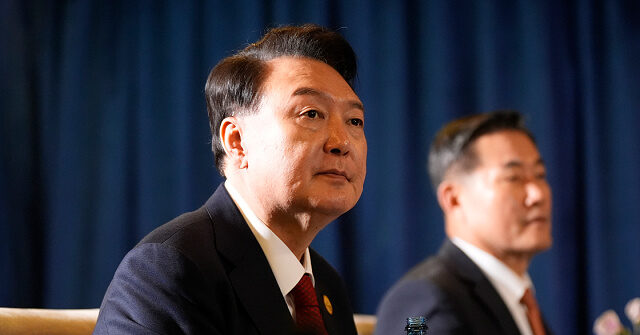In a dramatic escalation of political turmoil, the South Korean Justice Ministry imposed a travel ban on President Yoon Suk-yeol on Monday amidst ongoing criminal investigations, including charges of treason related to his controversial declaration of martial law. Yoon’s military rule announcement, made on local airwaves, was justified as a necessary response to vague threats from “unscrupulous pro-Pyongyang anti-state forces.” He accused the leftist-dominated National Assembly of obstructing his governance, which he claimed forced his hand. This declaration caught the nation off guard, leading to unprecedented actions from lawmakers determined to counteract Yoon’s martial law decision.
In a remarkable scene, National Assembly members struggled to convene amidst armed soldiers who were deployed to enforce martial law. Despite confronting significant barriers, including climbing over fences and enduring the threat of military intervention, the lawmakers managed to vote unanimously against the martial law declaration. Their resilience eventually led Yoon to rescind the order shortly after. However, his actions set off a political firestorm, prompting the opposition Democratic Party to initiate impeachment proceedings against him for violating constitutional duties, further heightening the stakes of the ongoing political crisis.
As the tensions rose, the legal consequences for Yoon intensified, marked by his ban from international travel. Legal experts pointed out that the issuance of a travel ban for a sitting president is unprecedented in South Korea, elevating the severity of the situation. Yoon’s case exemplifies a unique legal quagmire as treason is one of the rare crimes where presidential immunity does not apply. The implications of such a ban highlight a profound shift in the political landscape of South Korea, as Yoon’s ability to conduct diplomatic affairs is severely compromised at a crucial juncture.
Beyond Yoon, his entire administration faces scrutiny, with 11 other officials currently under investigation related to the martial law declaration. The case has prompted additional discussions regarding the legal proceedings against key figures within his administration, suggesting a widespread accountability movement against those who participated in or supported the controversial decrees. This situation highlights a potential reevaluation of the ruling party’s internal dynamics, showcasing fractures within Yuon’s People Power Party, especially as its head, Han Dong-hoon, openly called for Yoon’s impeachment.
The political atmosphere remained charged as various factions vied for power and control over the narrative. Han Dong-hoon’s contradictory statements regarding Yoon’s leadership and the future of governance added to the disarray within the People Power Party. While some factions resist the push for impeachment, others are exploring power vacuums that may arise should Yoon step down. This internal division was evident when proposed votes for impeachment were thwarted due to a lack of attendance among crucial party members, further complicating the path forward for the party and the nation.
Public reaction to Yoon’s martial law declaration has been polarized, with widespread protests erupting calling for his resignation. The near-daily demonstrations organized by leftist groups stand in stark contrast to the more subdued support rallies from conservative factions, showcasing the deeply divided national sentiment. Amidst this turmoil, Yoon has made tepid public appearances, acknowledging the unrest his actions have caused and expressing regret while promising that there would not be a repeat of the martial law decree. As the situation continues to unfold, the future of Yoon’s presidency hangs in a precarious balance, reflective of broader societal divides and political challenges facing South Korea.

